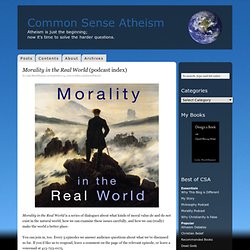

Philosophy. 208 Nietzsche’s Progeny (1991) - Rick Roderick. Philosophy: Guide to Happiness. We tend to accept that people in authority must be right.

It's this assumption that Socrates wanted us to challenge by urging us to think logically about the nonsense they often come out with, rather than being struck dumb by their aura of importance and air of suave certainty. This six part series on philosophy is presented by popular British philosopher Alain de Botton, featuring six thinkers who have influenced history, and their ideas about the pursuit of the happy life. Socrates on Self-Confidence (Part 1) - Why do so many people go along with the crowd and fail to stand up for what they truly believe?
Partly because they are too easily swayed by other people's opinions and partly because they don't know when to have confidence in their own. Seneca on Anger (Part 3) - Roman philosopher Lucious Annaeus Seneca (4BCE-65CE), the most famous and popular philosopher of his day, took the subject of anger seriously enough to dedicate a whole book to the subject. 03 - Seneca on Anger - Philosophy: A Guide to Happiness. Heidegger: Thinking the Unthinkable. German philosopher Martin Heidegger addressed the central question of human existence full on, by examining how human self-awareness depends on concepts of time and death.

His preoccupation with ontology - the form of metaphysical inquiry concerned with the study of existence itself - dominated his work. The central idea of his complex Sein und Zeit (Being and Time) (1927) could be summed up in the phrase 'being is'. Man had to ask himself 'what is it to be? ' and only by doing this, and standing back from absorption into objects and other distractions, could he actually exist.
For Heidegger, the constant fear of death and the anxieties of life helped man to ask this central question – the mystery of life was intimately linked to the individual's confrontation and consideration of the temporary nature of their own existence. Philosophy. Philosophy since the Enlightenment, by Roger Jones. FACTS / THEORIES / KNOWLEDGE. 100 Facts. Rationally Speaking. Promoting critical thinking and skepticism about the central beliefs of society. PhilPapers: Online Research in Philosophy. Ethics and Values.
Morality in the Real World (podcast index) Morality in the Real World is a series of dialogues about what kinds of moral value do and do not exist in the natural world, how we can examine these issues carefully, and how we can (really) make the world a better place.

You can join in, too. Every 5 episodes we answer audience questions about what we’ve discussed so far. If you’d like us to respond, leave a comment on the page of the relevant episode, or leave a voicemail at 413-723-0175. You can listen to all episodes at archive.org, or subscribe in iTunes or with RSS.
Episodes are best enjoyed in order, but it’s not strictly necessary. Season One 01: Introduction [mp3] 02: God is Not the Ground for Morality [mp3]
Free Will & Determinism. The Socratic Method. The Socratic Method:Teaching by Asking Instead of by Tellingby Rick Garlikov The following is a transcript of a teaching experiment, using the Socratic method, with a regular third grade class in a suburban elementary school.

I present my perspective and views on the session, and on the Socratic method as a teaching tool, following the transcript. The class was conducted on a Friday afternoon beginning at 1:30, late in May, with about two weeks left in the school year. This time was purposely chosen as one of the most difficult times to entice and hold these children's concentration about a somewhat complex intellectual matter. The point was to demonstrate the power of the Socratic method for both teaching and also for getting students involved and excited about the material being taught.
The experiment was to see whether I could teach these students binary arithmetic (arithmetic using only two numbers, 0 and 1) only by asking them questions. Philosophy since the Enlightenment, by Roger Jones. What is Stoicism and How Can it Turn your Life to Solid Gold? A few weeks ago, I got a really interesting email from a guy in Norway that said something like, “Hey Mr.

MM.. What you are preaching is Pure Stoicism, with a great twist and perception on today’s world … I love it!!” * “Stoicism?” I asked, “You mean like the Stoics in Shakespearean plays that show no emotion of any sort? But it turns out I had fallen into a common misconception. From reading the book, I learned that Stoicism was actually a shockingly advanced old philosophy that found many followers in ancient Rome. Stoicism, in short, is a series of mental techniques and ways of life that allow you to decrease and then virtually eliminate all negative emotions such as anger, fear, anxiety, and dissatisfaction, while simultaneously building up a tide of pure Joy inside you that eventually starts to make you jump around and boogie at unexpected moments, and occasionally shout out “AHH YEAH!!”
Sounds pretty good, doesn’t it? Stanford Encyclopedia of Philosophy. Squashed Philosophers- Condensed Plato Aristotle Augustine Descartes Hume Marx Freud Copernicus Hobbes Sartre Ayer Sade Wittgenstein Einstein. Three Minute Philosophy.